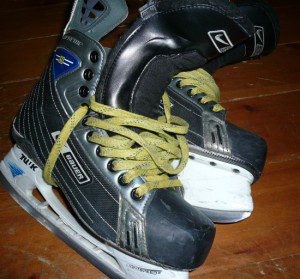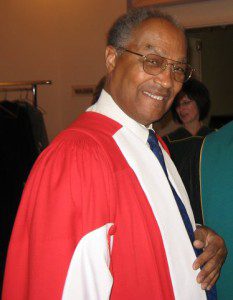
There’s a brave hockey coach in our midst. He’s paying a pretty severe penalty at the moment. You might have heard about him. A few weeks ago, Greg Walsh was coaching his Peterborough-area minor hockey team – a team of 16-year-old boys.
In the heat of a game, an opposing player blurted out a racial slur at one of Walsh’s players. The boy used the N-word. Walsh couldn’t believe his ears. He responded with the most demonstrative action he could think of.
“In order for us as a team to protect our player from that,” Walsh told a Toronto Star reporter, “we said that we weren’t going to play and we went to the dressing room.”
The two players involved in the incident both served minor penalties. The coach of the player who’d used the slur, benched him for part of the period. But when Walsh’s players refused to return to the ice, the full weight of the Ontario Minor Hockey League’s rulebooks was meted out.
Not on the offenders, but on the coach who’d stood up for his African-Canadian player. The OMHA regulations forced the immediate and indefinite suspension of Greg Walsh, so that today he watches his NAPA Auto Parts team from the bleachers of the arena in Peterborough.
“A rule is a rule,” Walsh said with resignation.
In contrast, the OMHA only saw fit to levy a three-day suspension on the player who used the epithet and his two minor hockey league coaches. Well, it seems to me that some of Canada’s sports governing bodies need to catch up with other walks of life in this country, if not just the 20th century for starters.
In fairness to some of those groups, last year, in response to a newspaper investigation of racism and violence in minor hockey, the Greater Toronto Hockey League increased its three-day suspension penalty for racial taunts to “indefinite suspension.” But I believe such events demand greater attention than what a senior manager at Hockey Canada observed: “(The regulations) allow the minor hockey associations to deal with different situations on a case-by-case basis.”
If regulations were left in place untouched indefinitely, would the powers that be ever have allowed this country’s constitution to be repatriated from Britain? Would male-dominated society ever have given the vote to women? Would colonial powers ever have abolished slavery? Unlikely.

That’s why it sometimes takes drastic action to bring about necessary change. It’s just over 10 years ago this fall that friend and professional colleague Fil Fraser spoke at the Harry Jerome Awards. That night, the Black Business and Professional Association of Toronto gave him the award “For Excellence in the Professions.” Himself a Canadian with ancestral roots in the Caribbean, Fraser then spoke about being a spokesman for writers, filmmakers, broadcasters and, at times, black Canadians.
“It’s not enough that we believe in equality,” he concluded. “Whenever we see injustice or inequality even in Canada, we must feel obliged to speak up.”
Well, it wasn’t too long after hearing Fraser’s call-to-action, that I found myself in such a position. In fact, it also happened at a hockey arena. One night, following an oldtimers’ game, members of my team that year tumbled into the dressing room to share the highs and lows of our performance on the ice.
As is often the case, along with the post-game analysis, some good-natured joking began. But suddenly it turned. Somebody cracked an N-word joke. I stopped laughing. I felt embarrassed. I wanted to hide. And based on the silence of the room, so did most of the rest of the team. I heard Fil Fraser’s call to “speak up” ring in my head. Then, I did something about it.
“That joke’s not appropriate,” I said out loud. “It’s not funny.”
I’m not sure who was more surprised at my outburst – the joke-teller or me. But at first he wasn’t prepared to back down. He tried to laugh off my criticism as being overly sensitive, without a sense of humour, too politically correct. However, having drawn a line in the sand, I wasn’t about to retreat. There was a very long and a very uncomfortable silence. Some nervous staring at the floor. Then, finally, it became clear to all that using the N-word in jokes or any other form of speech was no longer appropriate, indeed it was offensive and unacceptable.
But you see, unlike the minor hockey game in Peterborough a few weeks ago, my little exchange in the oldtimers’ hockey dressing room went no further. There were no repercussions, not penalties, no loss of face.
For Coach Greg Walsh, however, a man who spoke out against intolerance in broad daylight, in public and to the media, he’s paying an unfair price – a penalty for being right.
Thanks, Ted, for doing the right, but uncomfortable thing. This stuff is incremental – every time we let something slip by, it just grows.
Good on you.
Fil